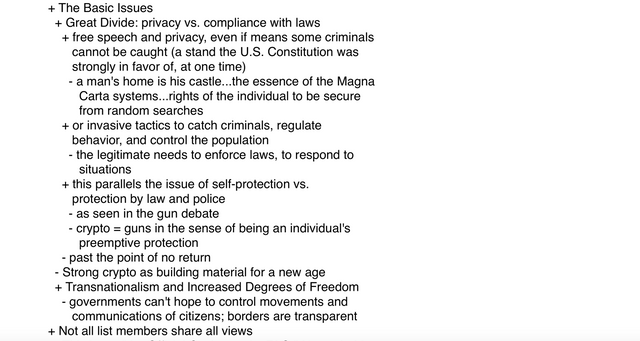
Every field has its pioneers and heroes, and every culture or scientific branch in the world can be associated with the brilliance of an individual or a group. In the case of the cypherpunk movement, it's Timothy C. May (colloquially referred to as Tim) who shines as bright as the community's ideals themselves.
For the mass of blockchain and cryptocurrency enthusiasts, Mr. May is a rather unknown who documented the cypherpunk movement in the early 1990s ("The Cyphernomicon" is still on of the most cited and influential works in the field). But to people like Nick Szabo, Wei Dai, Adam Back, Hal Finney, and John Perry Barlow, he was a living idol who promoted an ideology that can be put into practice through cryptography. Just like Sir Isaac Newton, Copernicus, and Galileo had the writings of Aristotle to provide inspiration and give them the required theoretical foundation to undergo scientific experiments, the cryptocurrency world had Timothy C. May to push for a truly anarchistic world where privacy and self-organization are the absolutely unquestionable norms.
It's safe to say that without the intellectual output of Mr. May we wouldn't have Bitcoin today. All the works that preceded Satoshi's blockchain project, from B-money to Bitgold, have drawn a clear ideological influence from the writings of Timothy C. May. Anyone reading "The Crypto Anarchist Manifesto" today can notice two essential elements: it's still as contemporary as ever, and the current cryptocurrency projects may not be the fruition of the envisioned "barbed wire fences" loss.
And even outside Bitcoin, we can see a clear influence in some key figures – in 2007, Nick Szabo has published a blog post in which he encouraged aspiring political activists who want to make a difference to make their own law by writing and using "cryptography, smart contracts, bit gold, digital cash, and other security protocols made possible by computer science."
The more Bitcoin moves towards institutional adoption, with mandatory KYC/AML procedures and centralized exchanges that can lock funds and block transactions, the farther we get from the ideals outlined in "The Crypto Anarchist Manifesto" and "The Cyphernomicon".
Ultimately, the legacy that Timothy C. May has left to us is a constant desire to attain absolute privacy. If John Perry Barlow has inspired an entire generation of cyber libertarians to demand their rights from governments (mostly through his famous piece, "A Declaration of the Independence of Cyberspace"), then Mr. May has given freedom lovers all around the world the motivation to write chain-liberating code which creates cryptographic shields. He was the Diderot of cypherpunks, a true man of letters and innovator who took precious time to document the works of his contemporaries and put together a massive dedicated encyclopaedia.
The next time we cheer and applaud as big financial institutions announce cryptocurrency investment funds, we should think twice. A couple of months before his passing, the cypherpunk was interviewed by Coindesk and he talked about the state of Bitcoin 10 years after the release of the whitepaper. In relation to the status-quo, he said that we definitely don't need another PayPal or an alternative way to make bank transfers. Bitcoin shouldn't turn into a surveillance apparatus which is friendly to KYC/AML practices, regardless of what big institutions want. The cypherpunk ethos demands for privacy, and cryptocurrencies should aspire to reach it to a greater extent (maybe that further developments like Schnorr signatures, confidential transactions, and even the Lightning Network will take us into a greater era of both privacy and fungibility).
To Mr. May, privacy must be absolute and unquestionable. His philosophy in regards to human nature was always positive, as he believed that outlaws and criminal activities are the exception of the rule (not the norm, as Orwellian governments want us to think).
And ultimately, regardless the part of the world where we find ourselves, the extent to which we understand coding and cryptography, and our ideological affinities, it's important to remember the work of a man who wanted nothing less than absolute freedom and privacy. In a sense, it's tragic that 2018 has taken away from us both John Perry Barlow and Timothy C. May. But in the grand scheme of things, this is a great opportunity for us to rediscover their writings, understand their viewpoints, and find ways to achieve these ideals through the technologies that we have (or at least support those who attempt to, for the greater good of our society).
Let's celebrate their efforts by lobbying our governments, educating ourselves and others about the importance of freedom and privacy, and writing world-changing code that will take us into a whole new era where reputation and trust replace mass surveillance.
Originally posted on Crypto Insider : https://cryptoinsider.com/timothy-c-may-a-tribute/